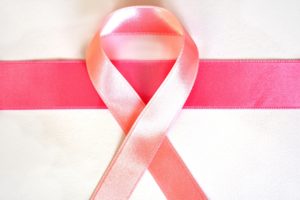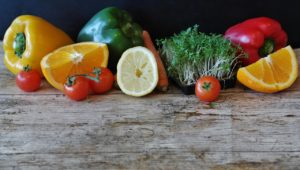Some of the bravest patients I’ve met have faced breast cancer. While most overcome it, the American Cancer Society reports that 1 in 8 women (13%) will be diagnosed with invasive breast cancer in their lifetime and 1 in 39 women (3%) will die from it.
 October is Breast Cancer Awareness Month, and the attention on the world’s number two killer of women in the United States gives us an opportunity to remind ourselves of the behaviors that increase and decrease our breast cancer risk. While some factors like heredity and age cannot be avoided, the American Cancer Society recommends that we adjust some lifestyle habits to lower the probability of contracting breast cancer :
October is Breast Cancer Awareness Month, and the attention on the world’s number two killer of women in the United States gives us an opportunity to remind ourselves of the behaviors that increase and decrease our breast cancer risk. While some factors like heredity and age cannot be avoided, the American Cancer Society recommends that we adjust some lifestyle habits to lower the probability of contracting breast cancer :
- Reduce or Limit Alcohol: many studies have proven conclusively that even one glass or less per day is linked with increased breast cancer risk in women. An article published just last week in the Journal of the American Medical Association found that during this pandemic alcohol consumption has increased by15% for women and 17% for men. Consider lowering or ending your use of alcohol as a gift to yourself, as self-care. Replace it with meditation, walks, rest, reading, funny movies, massage, and other relaxation strategies.
- Focus on a Whole Foods Diet – I won’t get rich telling you to eat your vegetables, yet I’ll keep sounding this note until I retire. Many researchers have concluded that those who consume whole fruits and vegetables that are full of phytonutrients can reduce cancer risk by as much as 40%. (One carrot alone contains 100 phytonutrients!) Studies have found phytonutrients help stop the formation of carcinogens AND stop these carcinogens from attacking healthy cells. Keep your plates colorful and fresh. Consider meat as more of a side-dish. I’ll see you in the produce section!
There are so many ways to make a plant-based diet delicious. Consider following Forks over Knives on Facebook or your other social media channels. Not only will you see thousands of colorful, delectable recipes, but you’ll also find many examples of people who’ve lost 50 pounds or more on a vegetarian diet.
- Get Healthy Sleep – it’s during sleep that the body repairs everything from organs to cells. A surprisingly complex process, healthy sleep has been associated with better memory and concentration, weight control, hormone balance, and athletic performance, as well as lower risks of heart disease, cancer, and mood disorders. If your sleep is consistently disrupted, consider it a serious health issue. Talk to your doctor and make the changes required to improve it.
- Combat Stress – many studies, along with a recent meta-analysis (study of studies) conclude that stress can increase the risk of breast cancer. Chronic stress weakens your immune system, reducing its ability to fight cancer cells. Stress hormones also inhibit the physiological process that kills diseased cells, leaving them free to replicate and spread. Consider learning to counter stress, or even changing life circumstances causing it, as a proactive optimal health measure. Meditation and mindfulness practices have helped me, my staff and my patients significantly.
- Work toward a Weight – the American Institute for Cancer Research now pinpoints obesity as “one of the leading causes of cancer.” It goes so far as to say that Americans getting to and staying at a healthy weight could prevent 117,000 new cancer cases each year. Sadly, more than half of us don’t even know that obesity can cause cancer. The good news is that just a 3% to 5% weight loss results in meaningful health benefits and lower cancer risk.
 Regular Movement and Exercise – The industrial age transplanted once physically active workers from the farms and fields to office buildings and desk chairs. We are built to move, and our bodies reward us when we do. Exercise not only helps you maintain a healthy weight, it keeps hormones in balance so that excess cancer-causing estrogen stays at a healthy level.
Regular Movement and Exercise – The industrial age transplanted once physically active workers from the farms and fields to office buildings and desk chairs. We are built to move, and our bodies reward us when we do. Exercise not only helps you maintain a healthy weight, it keeps hormones in balance so that excess cancer-causing estrogen stays at a healthy level.- Screenings and Early Detection – it’s an established fact that the earlier cancers are detected the better the outcomes. Consider that you are your own best healthcare provider – stay current on your mammograms, pap smears, and colonoscopies.
You’ll probably be seeing references to Breast Cancer Awareness Month over the next few weeks. Optimal health needs reminders and support . . . that’s why these branded months exist. I appreciate them for bringing up crucial topics. Still, sticking to diets, meditation and mindfulness practices, and exercise routines takes dedication. Joining groups of others doing the same provides some support. I commend you for bravely choosing healthy lifestyle habits that prevent breast cancer and many other diseases!
Thank you,
Dr. Jill Sohayda

 Regular Movement and Exercise – The industrial age transplanted once physically active workers from the farms and fields to office buildings and desk chairs. We are built to move, and our bodies reward us when we do. Exercise not only helps you maintain a healthy weight, it keeps hormones in balance so that excess cancer-causing estrogen stays at a healthy level.
Regular Movement and Exercise – The industrial age transplanted once physically active workers from the farms and fields to office buildings and desk chairs. We are built to move, and our bodies reward us when we do. Exercise not only helps you maintain a healthy weight, it keeps hormones in balance so that excess cancer-causing estrogen stays at a healthy level.